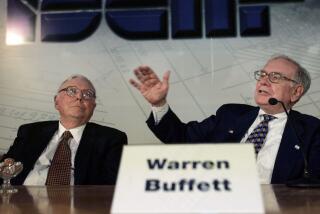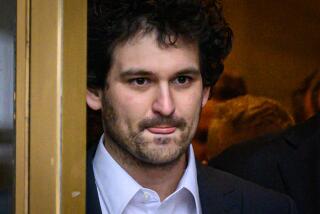Regulators to Query Buffett
NEW YORK — Uncharacteristically on the defensive, billionaire Warren E. Buffett on Tuesday denied having been briefed on suspect transactions between a unit of his Berkshire Hathaway Inc. and insurance giant American International Group Inc.
Buffett, long known as an avatar of good corporate governance, will be questioned April 11 by regulators in an investigation that focuses on a controversial product called “finite-risk” insurance. Berkshire said in a statement that Buffett was appearing voluntarily and that his submitting to questioning was part of the company’s effort to cooperate with the probe.
The regulators, too, seemed eager to dispel the impression that America’s best-known investor was suspected of wrongdoing.
“He is a witness, absolutely not a target,” said a person at one of the investigating agencies who agreed to speak on condition of anonymity.
The investigation, launched last fall, already has knocked Maurice R. “Hank” Greenberg from his post as chief executive of AIG, which he had run since 1967 and turned into a global powerhouse.
Two weeks after resigning under pressure as CEO, Greenberg, 79, agreed to step down as nonexecutive chairman, AIG announced Monday.
The probe is being conducted by the Securities and Exchange Commission and the office of New York Atty. Gen. Eliot Spitzer. The SEC subpoenaed Berkshire for documents Dec. 29 and Spitzer followed suit a week later.
The Buffett interview, at a location yet to be determined, is expected to be conducted under oath, people familiar with the probe said. Besides the SEC and New York attorney general’s office, representatives of the Justice Department also plan to participate, the sources said.
Among the questions that investigators are expected to ask Buffett, 74, is what he knew about a particular set of transactions in late 2000 and early 2001 that Greenberg initiated between AIG and Berkshire’s reinsurance subsidiary, General Re Corp.
Authorities suspect that the transactions may have enabled AIG to boost its insurance premium revenue without taking on any risk beyond the amount of the premiums, which could be a violation of accounting rules. An intentional effort to falsely inflate profit could be construed as fraud.
Berkshire took the unusual step Tuesday of issuing a statement to rebut recent news reports about the investigation.
The Wall Street Journal, citing an unidentified source, reported Tuesday that investigators suspected that Ron Ferguson, then CEO of General Re, had briefed Buffett in 2000 “on the nature of the deal” with AIG.
“To the contrary,” Berkshire said, “Mr. Buffett was not briefed on how the transactions were to be structured or on any improper use or purpose of the transactions.”
Buffett’s straightforward Midwestern manner, sharp stock-picking skills and criticism of costly executive pay packages have made him a hero to small and large investors alike. The current issue of Barron’s ranks Buffett as one of 30 most-respected chief executives in the country.
Berkshire, an Omaha-based holding company whose insurance interests account for more than a quarter of its revenue, said it didn’t expect the probe to result in any restatement of the company’s financial reports.
General Re was subpoenaed two years ago in a separate probe being conducted by the U.S. attorney for the Eastern District of Virginia. Regulators in Australia and Ireland also are scrutinizing the unit. General Re is one of the world’s leading reinsurance firms, which sell insurance to insurance companies. Insurance carriers traditionally take on reinsurance to protect against potentially devastating claims from natural disasters or sweeping legal judgments.
But General Re also is a global leader in finite-risk insurance, a specialized line of coverage. Unlike conventional insurance, in which losses may be open-ended, the new product covers situations in which the buyer faces quantifiable -- hence “finite” -- losses over an extended period of time.
In a simplified example, an insurer might charge a premium of $600 million for a policy that would cover as much as $1 billion in anticipated losses payable over 20 years, said Keith Buckley, a senior managing director at Fitch Inc., a ratings company that has been critical of finite-risk insurance.
The advantage for the buyer is that finite-risk insurance can shrink a near-certain $1-billion liability to $600 million, thus improving the company’s capital position by $400 million, Buckley said. The insurer, meanwhile, makes its money by investing the premium.
Accounting regulators have cracked down on finite-risk coverage in cases where the insurer does not appear to be shouldering any significant risk. Regulators have ruled that such a transaction amounts to a loan rather than an insurance contract.
Fitch takes the position that finite-risk insurance is “generally written for smoothing out earnings or enhancing capital” and that any resulting improvement to a company’s financial statements should be viewed skeptically, Buckley said in an interview Tuesday.
Berkshire Hathaway shares rose $200, to $87,000 on the New York Stock Exchange. AIG shares added $1.18, to $58.20, also on the NYSE.
More to Read
Inside the business of entertainment
The Wide Shot brings you news, analysis and insights on everything from streaming wars to production — and what it all means for the future.
You may occasionally receive promotional content from the Los Angeles Times.










